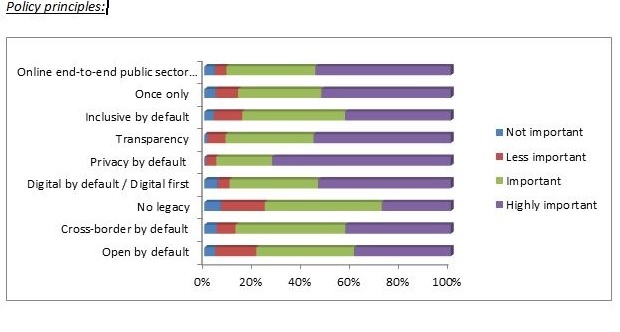E-Government II - public consultation

E-Government services are crucial to advance towards an European Digital Single Market. For this reason, the European Commission is working to adapt the EU policy and funding context to tackle this new reality.
- On the policy side by updating its current e-Government Action Plan to cover the years 2016-2020. The proposal together with the communication are expected to be presented in April 2016. Prior to this, the Commission released a Roadmap and launched a public consultation to get the views of public entities, businesses and citizens on the directions that the new Action Plan should take. The Commission has already announced that it’s aiming at further initiatives to fully digitize public administrations, achieve cross-border interoperability and facilitate easy interaction with citizens. Based on the outcomes of the consultation, the following preliminary trends can be observed.
-High priority is put on the Commission to accept e-Signatures for critical communication flows.
-At the same time, the Commission should have a leading role in setting up common standards and ensuring interoperability at all levels
-Citizens and businesses strongly support the application of the "once only" principle because submitting the same data more than once represents obstacles to their further use of online public services.
The graph below shows the policy principles identified by respondents and the support given to them.

Source: Key messages on the outcomes of the public consultation on the EU E-Government Action Plan 2016-2020
On the funding side, the European Commission has a wide range of funding instruments that are contributing to expanding the use of ICT at the different levels of the public administration for the period 2014-2020, the Connecting Europe Facility (CEF) being the most relevant one centrally managed at EU level. CEF aims at developing the building blocks of the Digital Single Market. It has a total budget of €1,2 billion earmarked out which calls for proposals for Business Registers Interconnection System (€3 million) ; Electronic Exchange of Social Security Information (€24.5 million); and eProcurement (€4.5 million) have been already launched. E-Delivery, E-Signature and E-Invoicing are expected for the second half of 2016. These grants will help European public administrations and businesses to hook up to the core platforms of the digital services that are the object of the calls. Finally, if you are an E-Government professional willing to share your experiences with the wider community, you can visit the JoinUp platform – a collaborative tool created by the European Commission and funded by Interoperability Solutions for European Public Administrations (ISA) Programme. At the platform support is also offered to find, choose, re-use, develop and implement existing or new interoperability solutions.
For more information on E-Government initiatives and EU funding instruments supporting them please check this post or email
By accepting you will be accessing a service provided by a third-party external to https://www.schumanassociates.com/
